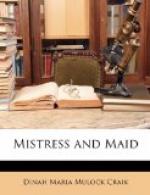“You see, my dear,” said Miss Balquidder, “when one has no duties, one must just make them; when we have nobody to care for us, we must take to caring for every body. I suppose”—here a slight pause indicated that this life, like all women’s lives, had had its tale, now long, long told—“I suppose I was not meant to be a wife; but I am quite certain I was meant to be a mother. And”—with her peculiar, bright, humorous look—“you’d be astonished, Miss Leaf, if you knew what lots of ‘children’ I have in all parts of the world.”
Miss Balquidder then went on to explain, that finding, from her own experience, how great was the number, and how sore the trial of young women who nowadays are obliged to work—obliged to forget that there is such a thing as the blessed privilege of being worked for—she had set herself, in her small way, to try and help them. Her pet project was to induce educated women to quit the genteel starvation of governesships for some good trade thereby bringing higher intelligence into a class which needed, not the elevation of the work itself, which was comparatively easy and refined, but of the workers. She had therefore invested sum after sum of her capital in setting up various small shops in the environs of London, in her own former line, and others—stationers, lace-shops, etc.—trades which could be well carried on by women.—Into the management of these she put as many young girls as she could find really fitted for it, or willing to learn, paying them regular salaries, large or small, according to their deserts.
“Fair work, fair pay; not one penny more or less; I never do it; it would not be honest. I overlook each business myself, and it is carried on in my name. Sometimes it brings me in a little profit; sometimes not. Of course,” she added, smiling. “I would rather have profits than losses; still, I balance one against the other, and it leaves me generally a small interest for my money—two or three per cent., which is all I care about. Thus, you see. I and my young people make a fair bargain on both sides; it’s no charity. I don’t believe in charity.”
“No,” said Hilary, feeling her spirit rise. She was yet young enough, yet enough unworn by the fight to feel the deliciousness of work—honest work for honest pay. “I think I could do it,” she added. “I think, with a little practice, I really could keep a shop.”
“At all events, perhaps you could do what I find more difficult to get done, and well done, for it requires a far higher class of women than generally apply: you could keep the accounts of a shop; you should be the head, and it would be easy to find the hands, Let me see; there is a young lady, she has managed my stationer’s business at Kensington these two years, and now she is going to be married. Are you good at figures; do you understand book-keeping?”
And suddenly changing into the woman of business, and one who was evidently quite accustomed both to arrange and command, Miss Balquidder put Hilary through a sort of extempore arithmetical catechism, from which she came off with flying colors.




